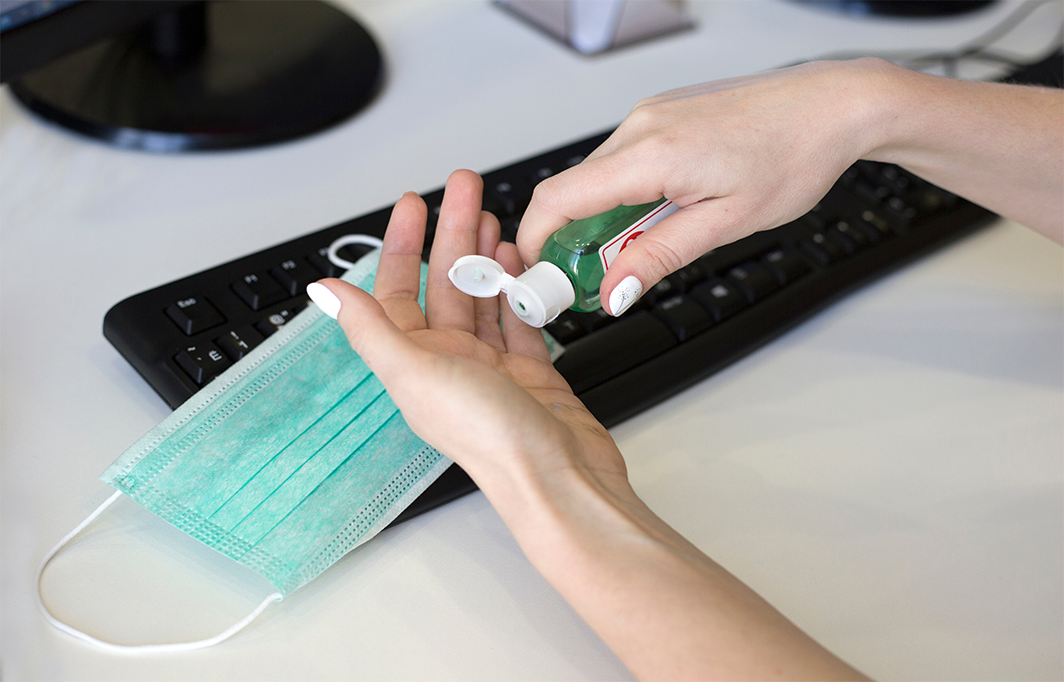IWFM research: hygiene concerns leave thousands anxious about return to the office
News
- General news
13 May 2020

- many UK employees are concerned about the health implications of returning to the office post-lockdown, according to new research
-
among office-based employees who are working from home during the Coronavirus, 59% are worried about being able to maintain social distancing, and nearly half (44%) are concerned about hygiene and cleaning standards in the office
-
research by IWFM also reveals inadequate at-home work set up for employees across the country is having a negative effect on productivity.
As lockdown measures begin to ease, many UK office workers are concerned about going back to the office - with worries rife over being able to maintain social distancing (59%) and appropriate hygiene and cleaning standards (44%), according to new research.
The YouGov poll, commissioned by IWFM, surveyed office workers across the country to reveal that over a third (34%) are concerned about getting used to a corporate office culture again after the lockdown.
Publicised as the government looks to assemble ‘Back to Work’ Guidelines for a range of sectors, the research found that despite these concerns - half (49%) of the UK’s employees now working from home are looking forward to getting back to the office. A working-from-home model has presented significant challenges to the workforce, including:
-
41% report having an inappropriate working environment at home. Only a quarter (24%) benefit from a separate home office, with two-thirds (64%) resorting to make-shift workstations at dining room tables, sofas and beds.
-
maintaining productivity, with half (50%) reporting finding it difficult to stay motivated and focused when working from home, and 44% facing challenges with distractions in the home. Those working from sofas and armchairs are taking a productivity hit – with 18% reporting a lack of motivation and over a quarter (25%) working fewer hours per day than they did in the office.
-
working from home is blurring lines between work and personal life. 38% find it hard to switch off at the end of the day and a quarter (25%) feel pressure to respond to emails after working hours. 62% miss a clear separation between work and home life, and 40% miss a clear structure to the day
-
social isolation is also a concern – with face-to-face interaction with colleagues the number one thing employees miss about office life (72%).
Chris Moriarty, Director of Insight at the Institute of Workplace and Facilities Management comments:
'As lockdown measures begin to ease, government and business attention is turning to the mammoth task of how, and when, to get employees across the UK safely back to work. Ensuring cleanliness and distance between colleagues will be high on the agenda – as will managing the implications of a workforce coming out of lockdown under increased levels of stress and anxiety.
'Yet there are wider challenges at play – it would be naïve to assume that ‘business as usual’ will look the same post-crisis, and many are considering the long-term implications of this national experiment in home working. Businesses looking to cut costs, or respond to increased employee demand for flexible working, need also consider the implications to the nation’s productivity of allowing employees to work from home without investing in an adequate home-working environment.
Moriarty continues: 'Those parked up on sofas and on dining room tables are missing the connectivity and productivity of an office environment more than those with dedicated home-office setups. When lockdown is lifted, and we see limits to the number of people allowed within an office building at any one time, businesses may look to use employee’s homework set up as a criteria for who should return, and when.
'The key thing is that businesses are mindful not to treat home versus office working as a binary choice but part of a strategic approach to support work wherever it can best take place. They should look to strike a balance between providing compelling reasons to return to a corporate space with flexible working policies and an investment in supporting a productive home-working set up.
'Workplace and facilities managers hold the key both to preparing buildings ready for reoccupation within new limits and to helping their organisations adjust to a new set of operating norms. The ‘super-connector' professionalism that facilities professionals offer in bringing together the space, culture and technology aspects of work into a workplace strategy can enable organisations and individuals to remain productive.'
The research was conducted by IWFM as part of its ‘Return to the Workplace’ campaign, which will cumulate in June with a report on the impact of the COVID-19 crisis on UK employees.
For more information on the campaign, visit: https://www.iwfm.org.uk/coronavirus-resources/covid-19-guidance-returning-to-work.html
Note: all figures, unless otherwise stated, are from YouGov Plc. Total sample size was 2260 adults, of which 1195 UK-based office workers, of which 404 who are now working from home (the core sample of the research). Fieldwork was undertaken between 22nd - 23rd April 2020. The survey was carried out online. The figures have been weighted and are representative of all GB adults (aged 18+).
